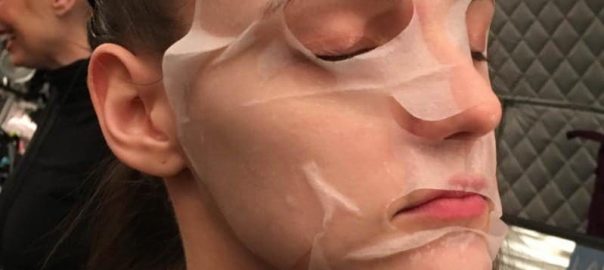Why Should I Use a Face Mask?

By now, we’ve all seen someone on social media, in a magazine, or on an airplane with a—let’s be honest here—slightly unnerving-looking sheet mask covering their face. Thankfully, at this point most of us know what we’re looking at. While the look of a sheet mask is a bit Phantom of the Opera, the benefits are well worth the unusual appearance.
Sheet masks have become increasingly popular over the last couple years, and there’s a good reason for that: Sheet masks allow product to sink deep into the skin, providing more concentrated and longer lasting results. Because the mask itself covers the surface of your skin, it decreases water loss and increases the temperature of the surface of your skin. This creates better penetration of the beneficial ingredients, allowing your skin to remain more hydrated and better able to receive the full results of the mask’s ingredients.
Because of their ability to provide quick, radiant results, celebrities have been using sheet masks for years to prep for special appearances or recover from long press circuits. Many celebrities rely on Dr. Harold Lancer’s Red Carpet Flash Facial, which uses Lancer Skincare’s Lift and Plump Sheet Mask for incredible results. This sheet mask utilizes highly concentrated anti-aging ingredients like apple stem cell compounds and Palmitoyl Pentapeptide-3 to provide a tighter and more lifted appearance. Natural humectants, like rose water and sodium hyaluronate, provide intense hydration and help your skin appear healthy and supple.
Even better, sheet masks are significantly less messy than traditional masks, and can even be applied while on an airplane or during a break at work. They come in individual packets, so they are extremely portable and easy to apply and remove. Simply tap the mask onto the face and relax. Sheet masks don’t require water for application or removal, and the remainder of the product in the mask packet can be patted directly on the skin for additional benefits.
In order to achieve full benefits, you should only apply sheet masks to clean, dry skin. Applying a mask to unwashed skin traps impurities and causes them to sink deeper into the skin, resulting in irritation and acne. Help ensure the ingredients can absorb fully by polishing and cleansing your skin thoroughly before application. This will allow all the nourishing ingredients of the mask to work more effectively, without being blocked by dead skin cells.
Those with acne-prone skin should be especially vigilant about washing skin thoroughly before a mask, and should never leave a mask on longer than directed. Leaving a sheet mask on too long allows the skin to overheat, and the increased temperature of your skin can cause an increase in acne-causing bacteria. Consider doing a spot test with your first mask, applying it only on your cheek to make sure you don’t experience an increase in acne in the following few days. If your skin doesn’t react, continue with the full mask as usual. Those with drier skin will also want to avoid leaving masks on longer than recommended, as masks that begin to dry out will dehydrate your skin rather than providing moisture.
Sheet masks provide your skin with much-needed hydration and nourishment, but they also provide you with an excuse to sit back and relax for 10 to 20 minutes. Use the opportunity to take care of your skin—and yourself—and apply a sheet mask once a week. Your skin will thank you.
IMAGE CREDIT: TELEGRAPH
 PREVIOUS (How to Get Rid of Acne Scars)
PREVIOUS (How to Get Rid of Acne Scars) NEXT (How to Get Rid of Blackheads)
NEXT (How to Get Rid of Blackheads)